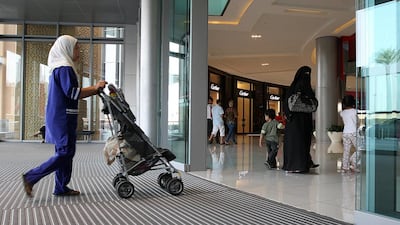A big increase in the minimum wage required for those seeking to sponsor domestic workers was made to improve conditions for household staff, authorities said.
This week The National reported that people who want to sponsor a domestic worker must now earn at least Dh25,000. The requirement was previously only Dh6,000.
In a statement on Wam, the UAE’s news agency, Khalil Khoury, undersecretary of the Ministry of Human Resources and Emiratisation for Assistant Labour Affairs, said the “new standards are based on studies on the cost of living and salaries of individuals and families that meet their basic needs”.
He said the increase also took into account “their ability to fulfil their legal obligations and the rights of domestic workers, such as providing a decent working environment and appropriate health care”.
A sponsor’s salary “must include the salaries of all employed family members and any allowances, such as housing allowance, as a condition of acceptance”, Mr Khou.
People with health conditions who require a carer must earn an individual or combined family income of more than Dh15,000 a month, said Mr Khoury.
Alternatively, domestic staff could be hired through agencies which do not require their clients to submit proof of earnings.
People who fail to meet the minimum salary requirements can also hire staff through Tadbeer service centres, which are regulated by the Ministry of Human Resources and Emiratisation.
Tadbeer offers two packages – in the first option it would appoint a domestic worker to work for a family for a specified period, but the worker is not permitted to live with the family in their home.
In the second package, a domestic worker can be hired on an hourly, daily or weekly basis.
The change in minimum wage for sponsors applies to domestic service contracts processed through government agencies such as Tadbeer, in addition to individual applications made via typing centres.
According to the 2017 UAE Nanny Salary Survey, from Rise, a wealth platform for low-income workers, 60 per cent of nannies earn less than Dh2,000 working as a domestic helper, while 40 per cent earn Dh2,000 or more, and just one in ten earn more than Dh3,000.
Other professions covered under the rule change include gardeners, private drivers, private teachers, and guards, as well as more unusual professions such as falcon helpers, sailors and private agricultural engineers.


